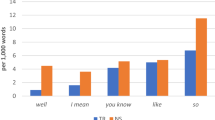Abstract
Social psychological research on educating African Americans about AIDS has linked cultural relevance to the persuasiveness and effectiveness of such educational materials. Twenty-eight gender-segregated focus groups were conducted, each consisting of between four and ten African American participants with an African American focus group leader. A content analysis of 14 of the focus groups held with men revealed a pattern whereby their was a noticeable difference in the men’s reported beliefs and practices as compared to their reports on questionnaires. Participants switched between two frameworks in a manner analogous to code switching. Furthermore, these data reveal that not only was linguistic competency (defined as the ability to effectively express and communicate) framework dependent, but the content of the discourse was framework-dependent. Specifically, the content of the discourse was inconsistent and at times contradictory between frameworks.
Similar content being viewed by others
References
Abraham, R. D. (1976). Talking Black. Rowley, MA: Newbury House Publishers, Inc.
Abrahams, R. D., and Gay G. (1975). Talking Black in the classroom. In P. Stoller (Ed.), Black American English: Its background and its usage in the schools and in literature (pp. 158–167). New York: Dell Publishing Company.
Au, K. H. (1993). Literacy instruction in multicultural settings. Fort Worth: Holt, Rinehart and Winston, Inc.
Baugh, J. (1983). Black street speech: Its history, structure, and survival. Austin: University of Texas Press.
Brown, G., and Yule, G. (1991). Discourse analysis. Cambridge: Cambridge University Press.
Burman, E., and Parker, I. (1993). Discourse analytic research: Repertories and readings of texts in action. New York: Routledge.
Clatts, M. C. (1994). All the king’s horses and all the king’s men: Some personal reflections of ten years of AIDS ethnography. Human Organization, 53(1), 93–95.
Fisher, W. R. (1987). Human communication as narration: Toward a philosophy of reason, value, and action. Richmond: University of South Carolina Press.
Fordham, S. (1999). Ebonics as guerrilla warfare. Anthropology and Education Quarterly, 30(3), 272–293.
Foster, M. (1989). It’s cookin’ now: a performance analysis of the speech events of a Black teacher in an urban community college. Language and Society, 18, 1–29.
Haskins, J., and Butts, H. (1993). The psychology of Black language. New York: Hippocrene Books.
Heath, S. B. (1983). Ways with words: language, life, and work in communities and classrooms. Cambridge: Cambridge University Press.
_____. (1986). What no bedtime story means: Narrative skills at home and at school. In B. Schiefflin and E. Ochs (Eds.), Language socialization across cultures. Cambridge: Cambridge University Press.
Herek, G. M., Gillis, R. J., et al. (1998). Culturally sensitive AIDS videos for African American audiences: Effects of source, message, receiver, context. American Journal of Community Psychology, 26(5), 705–743.
Hymes, D. (1985). Foundations in sociolinguistics: An ethnographic approach. Philadelphia: University of Pennsylvania Press.
Hymes, D. (2000). Beyond Ebonics: linguistic pride and racial prejudice. New York: Oxford University Press.
Ladson-Billings, G. (1994). The dreamkeepers: Successful teachers of African American children. San Francisco: Jossey-Bass Publishers.
Moerman, M. (1988). Talking culture: Ethnography and conversation analysis. Philadelphia: University of Pennsylvania.
Rogoff, B. (2003). The cultural nature of human development. New York: Oxford University Press.
Smitherman, G. (1986). Talkin’ and testifyin’: The language of Black America. Detroit: Wayne State University Press.
_____. (2000). Talkin’ that talk: Language, culture, and education in African America. New York: Routledge.
Tannen, D. (1984). Conversational style: Analyzing talk among friends. Norwood, NJ: Ablex Publishing Corporation.
Turner, P. (1993). I heard it through the grapevine: Rumor in African-American culture. Berkeley: University of California Press.
Author information
Authors and Affiliations
Rights and permissions
About this article
Cite this article
Lewis, J.L. Black talk about AIDS. Journal of African American Studies 8, 14–30 (2005). https://doi.org/10.1007/s12111-005-1001-0
Published:
Issue Date:
DOI: https://doi.org/10.1007/s12111-005-1001-0




